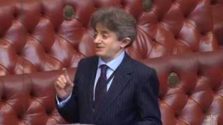 In May 2016, Lord Shinkwin, brought his Abortion (Disability Equality) Bill to the House of Lords.
In May 2016, Lord Shinkwin, brought his Abortion (Disability Equality) Bill to the House of Lords.
Lord Shinkwin, who himself has osteogenesis imperfecta, has been a life peer since 2015 and prior to this spent a number of years in the voluntary sector, working for charities such as RNID, Cancer Research UK and the Royal British legion.
His private member’s bill seeks the provision of equality within the 1967 Abortion Act (and its subsequent amendment by the 1990 Human Embryology and Fertilisation Act), by changing the law to ensure that disability can no longer be given as a reason for termination at any gestation.
Lord Shinkwin and the supporting ‘We’re All Equal’ campaign cite the 1995 Disability Discrimination Act as a key base for their proposal as statements on their website qualify.
‘We’re all equal. That’s what the law says, isn’t it? Wrong…legal and lethal discrimination on the grounds of disability have been a reality for almost 50 years…’
Currently, under Section (1)(1)d pregnancies with ‘physical or mental abnormalities causing serious handicap’ can be terminated up until birth, whereas a limit of 24 weeks is set for ‘able-bodied’ babies. There were 3,216 abortions carried out on these grounds in England and Wales in 2015, including 1,046 over 20 weeks and 230 over 24 weeks.
The bill proposed by Lord Shinkwin is, however, not supported by the British Medical Association, the Royal College of Obstetricians and Gynaecologist, the Faculty of Sexual and Reproductive Healthcare or the British Maternal and Fetal Medicine Society. They describe the bill as neither ‘patient nor woman-centred’. The BMA cites in their briefing document that ‘it would be inhuman – and risk psychological harm – to make a woman carry a pregnancy to term when the fetus will not survive, if she does not want to’.
As Lord Shinkwin has intimated in the second reading of his bill in the Lords, he feels it is a ‘modest and reasonable’ amendment and if passed it is likely to have very little impact on the status quo. Women will still be able to opt for abortion up to term under sections 1(1)b and 1(1)c, where two medical practitioners agree that it is necessary to prevent serious permanent injury to the mother’s mental or physical health or there is risk to the life of the mother. But Lord Shinkwin explains that passing his bill will mean that the ‘principle of disability discrimination itself would no longer be enshrined in law.’
The bill has reached the report stage in the Lords but will not be granted any further days of debate so will now fall. Any bill needs to pass through both houses before it can become law. Amendments to the bill proposed by several peers including Lord Winston – the IVF pioneer. His amendment, which sought to see fetuses with severe lethal anomalies exempt from the bill was debated, but later withdrawn without a vote on 24 February 2017.
He stated that most of the 6,500 known fetal disorders are fatal and kill children before the age of three. He also argued that use of words and phrases such as ’eugenics‘ are a ‘misunderstanding’ of the four pillars of medical ethics – autonomy, beneficence, non-maleficence and justice, as well as the normative value in our society that we accept termination of pregnancy, particularly in cases where a fetus is ‘severely damaged and unlikely to survive or is going to be extremely ill and in great pain’.
Shinkwin’s bill follows the ‘Don’t Screen Us Out’ campaign (DSUO) which describes itself as a grass-roots initiative that is calling for the government to halt the introduction of cell free fetal DNA, non-invasive prenatal testing (cffDNA NIPT) as a second line antenatal screening tool (See previous CMF blogs on NIPT here, here, here, here and here). The Lord Bishop of Bristol commented in the second reading of the bill, that this tool brings a new urgency to the Abortion (Disability Equality) Bill.
The 2013 National Down Syndrome Cytogenetic Register(NDSCR) report shows that 90% of babies who are prenatally diagnosed with Down’s syndrome are aborted. DSUO argues that the introduction of NIPT would enable the increased selective elimination of children with Down’s syndrome. Rather, they suggest, medical reforms in the areas of accommodation, inclusion and support for disability should be enacted prior to the implementation of cffDNA testing.
This all provides food for thought for healthcare professionals on both the provision of disability care in the UK and the rights of those with disabilities diagnosed prior to birth. As well as the age-old abortion debate, especially in view of Diana Johnson’s new termination bill (see CMF blogs here and here).
The outcomes of this will speak volumes as to how we see and protect the most vulnerable people in society, as well as how we live out Christ’s example of laying his life down for the weak (Romans 5:6).
Rachel Owusu-Ankomah
Rachel is a CMF Associate Staffworker and Junior Doctor



